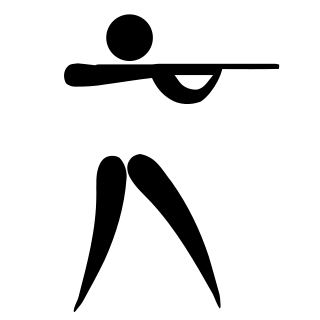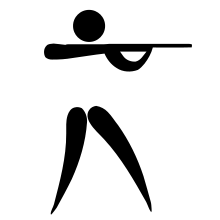
The men's ISSF 25 meter rapid fire pistol competition at the 2004 Summer Olympics was held on 21 August at the Markopoulo Olympic Shooting Centre near Athens, Greece. This was the last Olympic competition before the major rule changes that took place on 1 January 2005, and which lowered the results of the event. There were 17 competitors from 14 nations.
The men's 10 metre air pistol competition at the 2004 Summer Olympics was held on 14 August at the Markópoulo Olympic Shooting Centre near Athens, Greece.

The men's ISSF 50 meter pistol competition at the 2004 Summer Olympics was held on 17 August at the Markópoulo Olympic Shooting Centre near Athens, Greece. There were 42 competitors from 31 nations.

The men's ISSF 25 meter rapid fire pistol event at the 2008 Olympic Games took place on August 15 and 16 at the Beijing Shooting Range Hall. There were 19 competitors from 14 nations. The event was won by Oleksandr Petriv of Ukraine, the nation's first medal in the event. Germany took silver and bronze. It was Schumann's fifth and final Olympic medal in the event; with three golds and two silvers, he was individually more successful than any nation other than Germany. After rule changes, new Olympic records were established by Keith Sanderson and Petriv (final).

The men's ISSF 50 meter pistol event at the 2008 Olympic Games took place on August 12 at the Beijing Shooting Range Hall. There were 45 competitors from 32 nations. The event was won by Jin Jong-oh of South Korea, the first of his three consecutive victories in the free pistol. It was his second medal, after taking silver in 2004; he was the 10th man to win multiple medals in the event.

The men's ISSF 25 meter rapid fire pistol competition at the 2000 Summer Olympics was held on 20 and 21 September. There were 20 competitors from 17 nations. Nations had been limited to two shooters each since the 1952 Games. The event was won by Sergei Alifirenko of Russia, the nation's first medal independent of the Soviet Union. Michel Ansermet's silver was Switzerland's first medal in the event since 1920; Iulian Raicea's bronze was Romania's first since 1984.

The men's ISSF 50 meter pistol was one of the fifteen shooting events at the 1996 Summer Olympics, held on 23 July at the Wolf Creek Shooting Complex in Atlanta. There were 45 competitors from 28 nations. It was the first time decimals were used in the 50 metre pistol finals. Boris Kokorev set a new Olympic record after scoring 570 points in the qualification round and 96.4 in the final, winning the gold medal, while places 2 through 5 were occupied by Belarusian and Italian shooters. Russia, Belarus, and Italy all received their first medal in the free pistol. Silver medalist Igor Basinski was the ninth man to win multiple medals in the event.

The men's ISSF 25 meter rapid fire pistol was one of the fifteen shooting events at the 1996 Summer Olympics. Ralf Schumann defended his title from Barcelona, setting two new Olympic records. Schumann was the third man to successfully defend an Olympic title in the rapid fire pistol, and the first to win three or more medals in the event; he would finish his career with three golds and five total medals. Emil Milev of Bulgaria (silver) and Vladimir Vokhmyanin of Kazakhstan (bronze) each won their nation's first medals in the event, though Vokhmyanin was a repeat bronze medalist, making him the 10th man to win multiple medals in the event. There were 23 competitors from 19 nations. Nations had been limited to two shooters each since the 1952 Games.

The men's ISSF 50 meter pistol was one of the thirteen shooting events at the 1992 Summer Olympics. There were 44 competitors from 29 nations. Nations had been limited to two shooters each since the 1952 Games. The competition was held on 26 July 1992 at the Mollet del Vallès shooting range.

The men's ISSF 25 meter rapid fire pistol was one of the thirteen shooting events at the 1992 Summer Olympics. It was the first Olympic rapid fire competition on the new, circular targets, and also the only one in history to feature both a semifinal, consisting of four four-second series for the top eight shooters, and a final, consisting of two additional four-second series for the top four. Afanasijs Kuzmins and Ralf Schumann, who had battled for the gold medal four years earlier, once again clinched the top two spots, although in reversed order. The two were the eighth and ninth men to win multiple medals in the event. Schumann's win was the first victory for unified Germany since 1936, though East Germany had won medals since. Kuzmins earned Latvia's first independent medal. Vladimir Vokhmyanin of the Unified Team finished on the same score as Kuzmins, but a lower final score demoted him to bronze. There were 30 competitors from 23 nations. Nations had been limited to two shooters each since the 1952 Games.

The men's ISSF 50 meter pistol was one of the thirteen shooting events at the 1988 Summer Olympics. It was the second Olympic free pistol competition to feature final shooting, after an abortive attempt in 1960. There were 43 competitors from 31 nations. Nations had been limited to two shooters each since the 1952 Games. The event was won by Sorin Babii of Romania, the nation's first victory in the event and first medal in free pistol since 1972. Ragnar Skanåker of Sweden repeated as silver medalist, the second man to earn three medals in the free pistol; four years later, he would become the first to win four medals. Soviet Igor Basinski took bronze.

The men's ISSF 25 meter rapid fire pistol was one of the thirteen shooting events at the 1988 Summer Olympics. The last Olympic competition on the non-circular target, and the first to feature final shooting, it was won by Latvian Afanasijs Kuzmins after a perfect 300 in the first stage, 298 in the second, and two perfect 50 series in the final, thus not allowing Ralf Schumann and John McNally to eliminate his one-point pre-final lead. It was the first gold medal for the Soviet Union in the event. Schumann comfortably won the silver while McNally fell back during the final with a 47 and a 46, finishing seventh and giving way to a third-place tie between Zoltán Kovács and Alberto Sevieri, resolved in Kovács's favour on grounds of higher final score. The bronze was Hungary's first rapid fire pistol since 1952. There were 32 competitors from 23 nations. Each nation had been limited to two shooters since the 1952 Games.

The mixed ISSF 50 meter pistol was a competition at the 1972 Summer Olympics. It was held on 27 August 1972 at Schießanlage in Munich. There were 59 competitors from 36 nations. Nations had been limited to two shooters each since the 1952 Games.

The men's ISSF 50 meter pistol event at the 2012 Olympic Games took place on 5 August 2012 at the Royal Artillery Barracks. There were 38 competitors from 27 nations. The event was won by Jin Jong-oh of South Korea, the second of his three consecutive victories in the free pistol. He was the first shooter to win two individual free pistol gold medals. It was his third medal in the event, making him the fourth man to earn three free pistol medals. His countryman Choi Young-rae took silver, the first time since 1976 that a nation had finished 1–2 in the event. Chinese shooter Wang Zhiwei received bronze.

The men's ISSF 25 meter rapid fire pistol event at the 2012 Olympic Games was held on 2 and 3 August 2012 at the Royal Artillery Barracks. There were 18 competitors from 13 nations. The event was won by Leuris Pupo of Cuba. Silver went to Vijay Kumar of India, while Ding Feng of China took bronze. It was the first medal in the event for all three nations. Ralf Schumann missed the final for the first time; he had reached the final in the previous six Games.

The mixed ISSF 50 meter pistol was one of the seven sport shooting events at the 1980 Summer Olympics. There were 33 competitors from 19 nations. Nations had been limited to two shooters each since the 1952 Games. The gold medal was won by Aleksandr Melentyev of the Soviet Union who broke the world record with 581 points. It was the Soviet Union's third victory in the event, second-most behind the United States at four. Melentyev defeated Harald Vollmar of East Germany by 13 points. For Vollmar this was his third Olympic medal in the same event, having won silver at 1976 Montreal and bronze at 1968 Mexico City. Vollmar was the first man to win at least three medals in the free pistol. Lyubcho Dyakov's bronze was Bulgaria's first medal in the event.

The men's ISSF 50 meter pistol event at the 2016 Olympic Games took place on 10 August 2016 at the National Shooting Center. There were 41 competitors from 29 nations. The event was won by Jin Jong-oh of South Korea, his third consecutive victory in the free pistol. He was the only man to win two gold medals in the event, much less three. Jin was also the second man to win four medals of any color in the event, after Ragnar Skanåker of Sweden from 1972 to 1992. Hoàng Xuân Vinh took silver, the first medal for Vietnam in the event. Kim Song-guk's bronze was North Korea's first medal in the free pistol since 2004.

The men's ISSF 25 meter rapid fire pistol event at the 2016 Olympic Games took place on 12 and 13 August 2016 at the National Shooting Center. There were 26 competitors from 20 nations. The event was won by Christian Reitz of Germany, the nation's first victory in the event and fifth overall. Reitz, the bronze medalist in 2008, was the 12th man to win multiple medals in the rapid fire pistol. Jean Quiquampoix of France took silver, the nation's first medal in the event since 1900. China took bronze, just as in 2012, this time by Li Yuehong.

The men's ISSF 50 meter pistol was a shooting sports event held as part of the Shooting at the 1960 Summer Olympics programme. It was the tenth appearance of the event. The competition was held on 5 and 6 September 1960 at the Umberto I Shooting Range in Rome. 67 shooters from 40 nations competed. Nations had been limited to two shooters each since the 1952 Games. The event was won by Aleksey Gushchin of the Soviet Union, as the Soviet team finished 1–2 with Makhmud Umarov repeating as silver medalist. Yoshihisa Yoshikawa of Japan took bronze.

The mixed ISSF 50 meter pistol was a shooting sports event held as part of the Shooting at the 1976 Summer Olympics programme. It was the fourteenth appearance of the event. The competition was held on 18 July 1976 at the shooting ranges in Montreal. 47 shooters from 31 nations competed. Nations had been limited to two shooters each since the 1952 Games. The event was won by Uwe Potteck, with East Germany finishing 1–2 as Harald Vollmar took silver. It was East Germany's first victory in the event. Rudolf Dollinger of Austria repeated as bronze medalist. Vollmar and Dollinger were the fifth and sixth men to win multiple medals in the free pistol. Potteck had only begun the sport 23 months prior to his victory and his previous personal best in domestic competitions was a 568. In addition, his practice scores leading up to the games averaged around 563 to 565.













